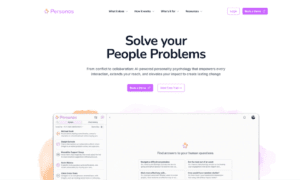In the aftermath of the Covid-19 pandemic, many businesses are grappling with high staff turnover, a phenomenon that has been widely termed “The Great Resignation.” This trend, where employees are leaving their jobs in large numbers or at least seriously considering it has posed significant challenges for organizations worldwide. However, businesses seeking to mitigate the effects of this mass movement may find a powerful tool in Hogan Assessments.
Hogan Assessments offers a comprehensive psychometric test suite to help businesses understand their employees’ personalities, values, and motivations. This crucial insight allows organizations to foster a positive work culture, reducing the likelihood of staff attrition.
Dr Ryne Sherman, Chief Science Officer at Hogan Assessments, and former CEO Dr Scott Gregory have previously explored the impact of “The Big Quit,” also referred to as “The Great Reshuffle.” This term first emerged in the United States in early 2021, where the trend appears to be slowing down. However, in the UK, the effects are still being widely felt, and organisations are actively seeking solutions to retain their workforce.
The Role of Hogan Assessments in Improving Workplace Culture
The post-pandemic workplace looks vastly different from what it once was. Two years of remote working and shifting public health measures have caused employees to reassess their professional expectations and aspirations. Many have started exploring opportunities elsewhere, hoping for a more fulfilling work-life balance.
The transition back to office life has been relatively smooth for some organisations. Others, however, have struggled to reintegrate employees in a way that meets their evolving expectations. Those who have successfully navigated this change often have a solid understanding of their workforce’s personalities and team dynamics, which helps them create a workplace culture that employees want to be part of.
Dr Ryne Sherman has pointed out that toxic workplace environments—not external factors like salary—are among the leading causes of staff turnover. Research indicates that workplace toxicity is almost three times more influential in employee resignations than the second most significant factor. This underscores the need for businesses to prioritise culture and employee engagement.
Hogan Assessments provides a way to do just that. By offering deep insights into individual personality traits, these assessments allow organisations to better understand what motivates their employees. Identifying potential workplace stressors and areas of conflict enables managers to proactively address issues before they lead to resignations.
A toxic workplace, if left unchecked, can drive talent away. However, by recognising key personality traits and understanding how employees react to different situations, businesses can make strategic decisions that improve job satisfaction, workplace relationships, and overall morale.
Understanding Personality Assessments and Their Impact on Employee Retention
While the pandemic has undoubtedly changed people’s perspectives on work, Dr Sherman suggests that core personality traits remain relatively stable. This is encouraging news for businesses looking to enhance retention strategies, as it means they can leverage personality assessments to gain lasting insights into their workforce.
Dr Scott Gregory emphasises the role of personality traits—particularly extraversion and conscientiousness—in influencing employee decision-making. For example, extraversion, especially the ambition aspect, is linked to self-confidence, competitiveness, and goal-setting. Meanwhile, conscientious individuals, known for their discipline and organisation, often possess a strong sense of responsibility and drive.
Understanding these traits can help businesses create environments where employees feel empowered and valued, reducing the likelihood of them seeking opportunities elsewhere.
Additionally, the pandemic has seen a rise in retirements and career shifts, often driven by individuals re-evaluating their priorities and embracing remote work.
Personality assessments provide organisations with critical insights into why employees may be considering a change. With this knowledge, businesses can implement strategies that align with employees’ aspirations, offering flexible work arrangements, career progression opportunities, or other incentives that make staying within the organisation more appealing.
As businesses adapt to a post-pandemic world, one thing is clear: the traditional workplace has undergone a permanent transformation. While some companies have returned to full-time office operations, many have embraced hybrid or remote models. Understanding how different personality types respond to these working arrangements can help businesses create sustainable, employee-centric workplaces.
The Influence of “The Great Resignation” on Workplace Decision-Making
Dr Sherman has also highlighted another critical aspect of “The Big Quit”: the phenomenon of post-resignation regret. Many employees who left their jobs for better opportunities have found that the grass isn’t always greener. Impulsivity and cognitive biases can lead individuals to make hasty career decisions that they later regret. Given the unprecedented scale of resignations, it’s likely that many employees are now experiencing second thoughts.
Another contributing factor to high turnover rates is the ripple effect of resignations within an organisation. When employees see their colleagues leaving, they may begin questioning their own job satisfaction, even if they were not initially considering a move. This can create a self-perpetuating cycle of turnover that businesses must actively work to break.
Companies that recognise these psychological factors can use personality assessments to better understand their employees’ motivations and concerns. By identifying individuals who may be at risk of making impulsive career moves, businesses can engage in proactive conversations to address concerns, offer support, and reinforce the benefits of staying within the organisation.
Using Psychometric Testing to Understand and Address Employee Decisions
A one-size-fits-all approach to employee retention is unlikely to succeed. Each individual has unique personality traits that influence how they perceive their work environment, career prospects, and job satisfaction. Recognising these differences is key to developing effective retention strategies.
Psychometric testing has far-reaching implications for organisations looking to improve employee retention and workplace culture. By understanding what drives each employee, businesses can tailor their approach to career development, team dynamics, and leadership styles in a way that resonates with their workforce.
Hogan Assessments provides businesses with a scientific framework for understanding employee behaviour. By identifying personality traits that correlate with job satisfaction, motivation, and performance, organisations can take proactive steps to prevent turnover. These assessments also offer valuable insights into the role of flexibility and purpose in modern workplaces, helping businesses adapt to evolving workforce expectations.
By integrating psychometric testing into their retention strategies, businesses can better understand potential workplace challenges before they escalate. Understanding employees’ personalities allows organisations to predict and address dissatisfaction, ensuring a more engaged and committed workforce.
Harnessing Hogan Assessments to Combat “The Big Quit”
Dr Scott Gregory and Dr Ryne Sherman have extensively discussed how psychometric assessments can be used to enhance workplace culture and motivation. Their research supports the idea that businesses that invest in understanding their workforce will be better positioned to navigate the challenges posed by “The Great Resignation.”
With the insights provided by Hogan’s suite of assessments, organisations can foster stronger working relationships, improve job satisfaction, and ultimately reduce turnover. By addressing key drivers of employee disengagement, businesses can create environments where employees feel valued, motivated, and committed to long-term success.
Awair offers consultation and training to help businesses implement and interpret Hogan Assessments. Speak to Awair today to discover how psychometric testing can enhance your workplace culture and help you retain top talent.



































